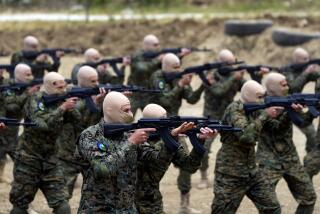Iran just won’t stay isolated
The U.N. Security Council on Monday passed a third round of sanctions against Iran. But at the same time that the United States and its European allies were building support for the new U.N. resolution, Iran’s president was making an official visit to Iraq, the first such visit since the Islamic Revolution in 1979. The upshot is that despite the tightening of U.N. sanctions, the West’s efforts to contain Iran are crumbling where it matters most: in the Middle East.
While Washington continues to press for a stark policy of political isolation and military containment, the Arab states of the Persian Gulf are overtly pursuing a new strategy of engagement. Even the Iraqi government, despite its ostensible alignment with the Bush administration, has opened its doors -- hence President Mahmoud Ahmadinejad’s red carpet treatment in Baghdad. If U.S. policy toward Iran is to yield results, Washington must adjust its approach to the reality that its closest allies in the Middle East have effectively broken with U.S. strategy.
Yet the Bush administration remains intent on mobilizing the political and military resources needed to hem in Iran. As President Bush put it during his Middle East tour in January: “Iran’s actions threaten the security of nations everywhere, so the United States is strengthening our long-standing security commitments with our friends in the Gulf and rallying friends around the world to confront this danger before it is too late.”
The problem is that Bush’s “friends in the Gulf” see things differently. As Prince Saud al Faisal, the foreign minister of Saudi Arabia, recently explained: “We are neighbors to Iran in the Gulf region, and as such we are careful that peace and tranquillity reign between the region’s countries. We have relations with Iran, and we talk to them, and if we felt any danger, we would not hesitate to discuss it with them.”
Although wary of Iran’s nuclear program and its regional ambitions, the Arab Gulf states are seeking to temper Tehran’s belligerence through accommodation and integration. Ahmadinejad was invited to Qatar last December to participate in a summit of the Gulf Cooperation Council, a privilege not extended to any of his predecessors. He visited Mecca during the hajj pilgrimage at the invitation of Saudi King Abdullah. Meanwhile, Egypt, which cut diplomatic ties with Iran after the Islamic Revolution, has been edging toward the resumption of relations. Arab leaders understand that dialogue and commerce may be the most efficient means of taming Tehran and drawing Iran into a stable regional order.
The Bush administration should follow the lead of its Arab allies in pursuing regional integration; a framework for doing so already exists: the Gulf Cooperation Council grouping of Bahrain, Kuwait, Oman, Qatar, Saudi Arabia and the United Arab Emirates.
Instead of viewing the council merely as a vessel for containing Iran, Washington should encourage its members to undertake defense integration with each other and the construction of a cooperative regional security order -- just as the U.S. encouraged European nations to pursue integration even as it helped protect them against the Soviet threat. Indeed, it was precisely because the European Union was up and running at the end of the Cold War that it was able to successfully embrace its former adversaries in Central Europe after the fall of the Berlin Wall.
Iran’s deepening engagement with the GCC, coupled with direct negotiations between Washington and Tehran, would similarly hold out hope of drawing the country into the embrace of regional integration.
After three decades of isolating Iran, it is time to acknowledge that economic sanctions, diplomatic pressure and military threats have failed to bring Tehran to heel. To be sure, Iran’s nuclear program, its support of extremist groups standing in the way of the peace process and its arming of Shiite militias in Iraq pose serious threats to the U.S. and its allies.
However, containment has not worked, and the debacle in Iraq has made clear the dangers of regime change by force. The best means of addressing the Iranian threat are through patient diplomacy and regional integration along the lines envisioned by America’s Arab allies.
More to Read
Sign up for Essential California
The most important California stories and recommendations in your inbox every morning.
You may occasionally receive promotional content from the Los Angeles Times.









